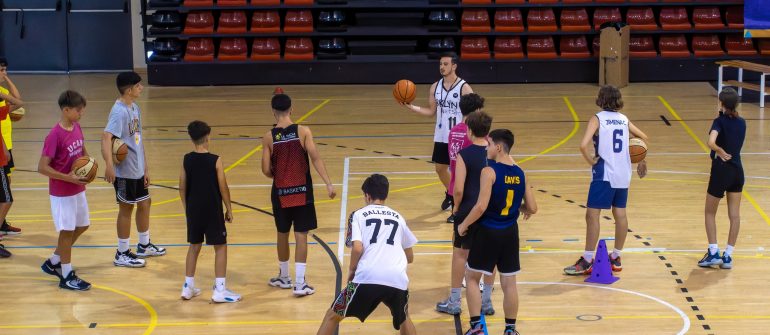“Learning results from what the learner does and thinks and only from what the learner does and thinks. The teacher can only promote learning by influencing what the learner does and thinks.”
Herbert A. Simon (1916-2001), researcher in politics and cognitive sciences.
Among the direct responsibilities of the coach, one of the most important is the selection or design of the tasks that will be part of the training process. Numerous factors influence the design of tasks. However, in this article we are going to focus on those aspects to be taken into account in order to build teaching situations that favour the learning of the principles or concepts of the game and the development of motor intelligence to play basketball. It is very important for the coach to take these criteria into account in order to assess whether the tasks proposed are the ideal ones to produce significant learning in his players.

- 1. Adaptation to the proposed objectives and contents
The objective of the task should appear many times during the exercise. If the objective of a task is shooting, there should be many shots, if it is bouncing, they should not stop bouncing….. If the objective of a game designed for players is to improve the ability to shoot at the basket and, on average, each player makes two shots per minute, we can affirm that the task will allow learning other actions but the degree of benefit with respect to shooting ability is very small.
- 2. Adapt the tasks to the level and age of the players.
Teaching tasks should respect the characteristics, needs and interests of the target players. The analysis of the characteristics must consider different dimensions of the individual’s personality: the one that refers to his biological or physical maturation, the one that refers to his psychological condition and the one that allows to establish his level or motor (playing) ability. The needs and interests of the players must be respected. We train for them!
Establishing the level of difficulty of the task thus becomes one of the important challenges for the coach, who must be aware of the need to approach it from different perspectives: physical, psychological, tactical and technical requirements.
- 3. Amount of integrated content
Given the limited time we usually have available for training, an important aspect is to work on content simultaneously. One of the quality criteria of the tasks is the number of contents integrated in it. More global teaching strategies can be more useful in this sense. In this case it is important that the trainer establishes which is the main content in each task (in order to focus the feedback in that direction) and which secondary contents can be given.
- 4. Degree of individual and collective participation
One of the fundamental prerequisites for learning is sufficient practice. The amount of practice should cover both technical and tactical aspects. Avoid exercises with long lines and long waiting times, and promote tasks where the players spend as much time as possible working.
- 5. Degree of cognitive involvement of the player
We must not only use repetitive exercises, but we must also be able to work on decision making in a continuous way. Perception and decision making are key in the training of the player.
- 6. Degree of freedom to explore and resolve the game situations that are generated in a personal way.
One of the objectives of the sports training process should be to ensure that players have a high degree of autonomy, which is justified from the point of view that they are the ones who have to make the decisions in matches. This is necessary for our players to develop creativity, which is a necessary aspect of our game.
- 7. Degree of transfer to the real game
What we practice in training sessions has to be reflected in competition. This means that our tasks have to reflect the internal logic of the game, and not do things that go against the rules or the functioning of the game itself. The ultimate goal is the competition. Until a technical or tactical element is done in a match, it cannot be considered as learned.
Whenever, as coaches, we want to plan a task in our training sessions, we must think about these 7 factors, and to what extent the quality criteria are fulfilled or not. This does not mean that all of them must always be fulfilled, but we must take them into account in order to try to create the best possible learning scenario.

